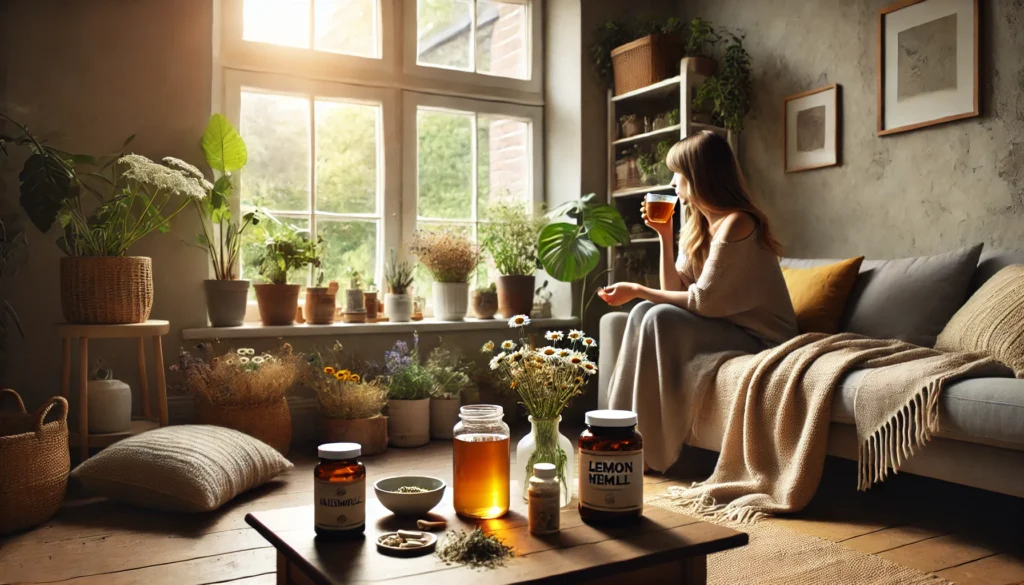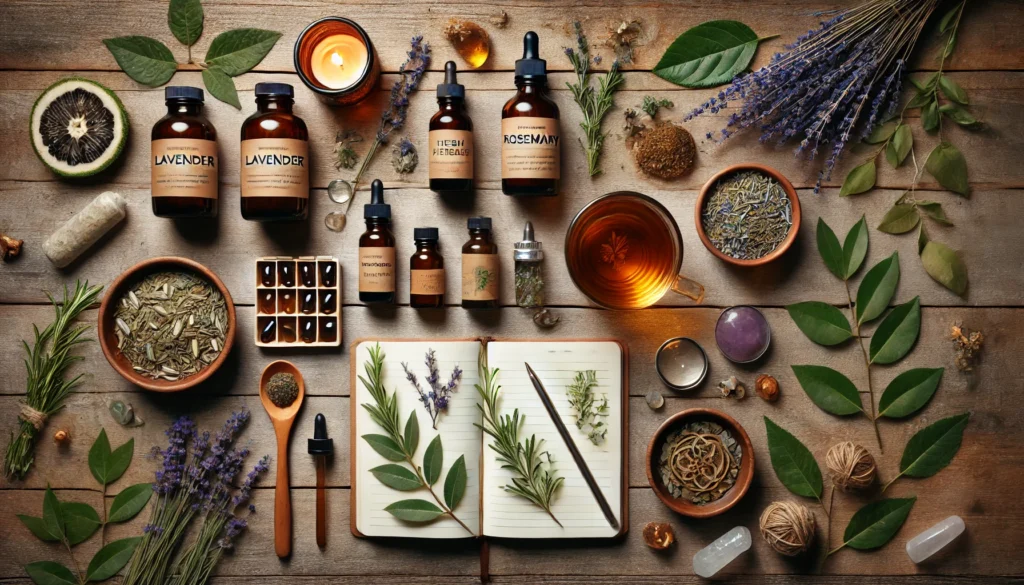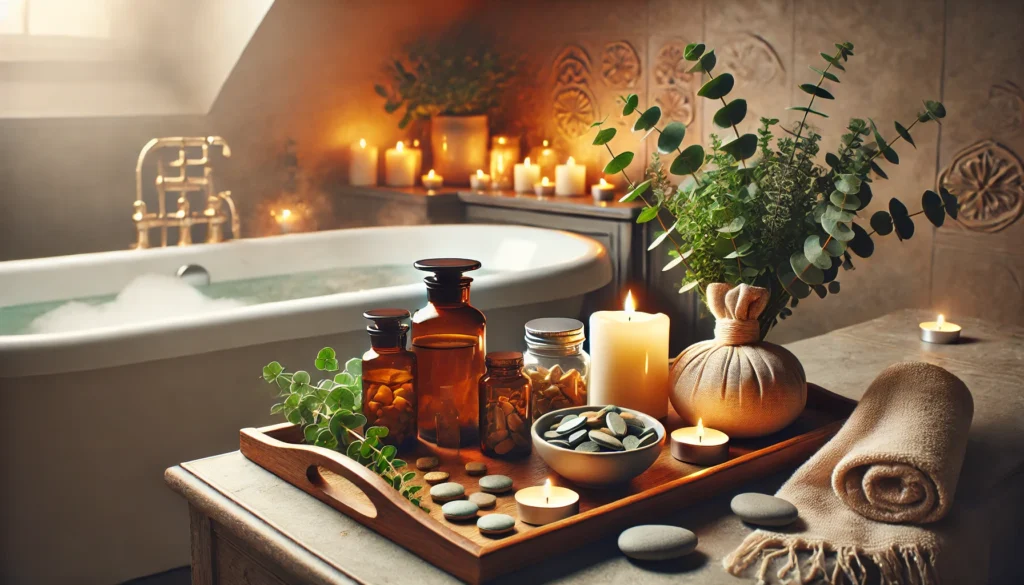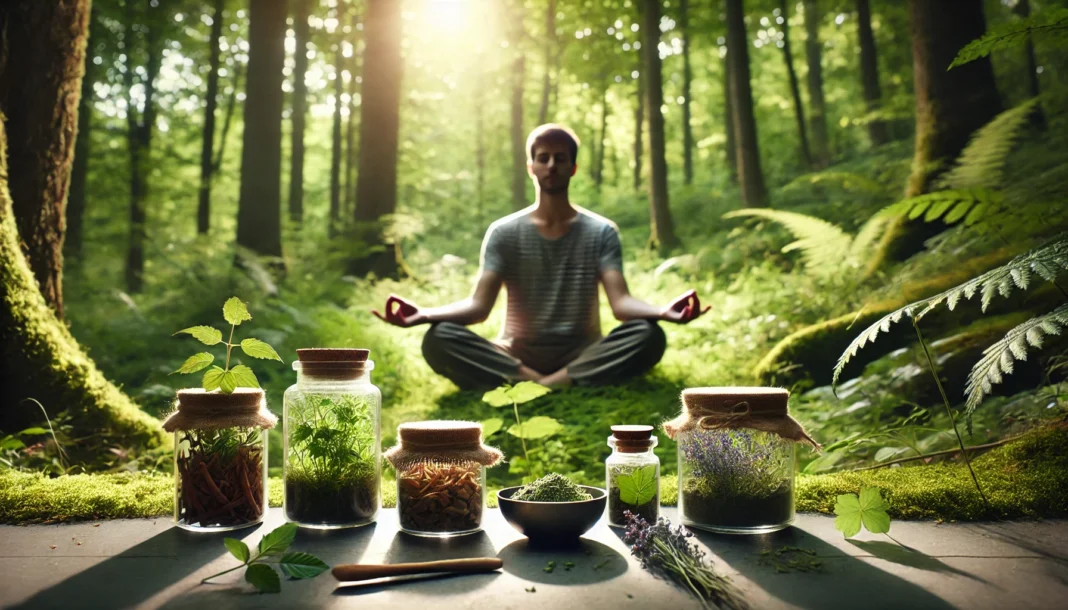Anxiety is a complex and often misunderstood condition, affecting millions of adults worldwide. While it can manifest differently from person to person, common symptoms include restlessness, persistent worry, fatigue, and difficulty concentrating. Traditional treatments such as cognitive behavioral therapy (CBT) and pharmacological interventions remain foundational, but a growing body of research and anecdotal evidence suggests that holistic approaches—including dietary supplements and herbal remedies—can serve as powerful adjuncts. These alternative methods not only promote emotional balance but also support long-term mental wellness in adults. By cultivating effective coping skills for anxiety, individuals can empower themselves to manage stress more resiliently and lead fuller, more grounded lives.
You may also like: Best Herbal Alternatives to Anxiolytics: Natural Remedies for Anxiety Relief
In recent years, there has been a cultural shift toward integrative health practices that combine conventional and complementary methods. This evolution is particularly evident in the realm of mental health, where many adults are turning to natural strategies to bolster emotional stability. Holistic supplements and herbal adaptogens, when used wisely and in consultation with healthcare professionals, can enhance the efficacy of traditional anxiety coping tools. As more people seek personalized and sustainable mental health strategies, it becomes essential to understand how these natural therapies work in concert with evidence-based practices.
Understanding Anxiety and Its Psychological Impact
To appreciate the value of alternative coping tools for anxiety, one must first understand the psychological underpinnings of the disorder. Generalized Anxiety Disorder (GAD), panic disorder, and social anxiety disorder are just a few of the many clinically recognized forms. They share a common thread: the brain’s overactivation of its fight-or-flight response, often without any immediate threat. This chronic hyperarousal can lead to physical symptoms such as elevated heart rate, gastrointestinal distress, and muscle tension. Over time, unmanaged anxiety can interfere with daily activities, damage relationships, and erode overall quality of life.
Adults dealing with anxiety often find themselves caught in a feedback loop where worry begets more worry. In these cases, developing effective anxiety coping skills for adults becomes not just helpful but essential. These skills can range from structured techniques like progressive muscle relaxation and guided imagery to mindfulness practices and journaling. While these psychological methods are time-tested and clinically supported, many individuals report an added benefit when they are complemented by natural aids that modulate stress hormones and support nervous system balance.

The Role of Holistic Supplements in Mental Health
Holistic supplements serve as nutritional reinforcements that can help regulate mood, promote relaxation, and support cognitive function. For adults looking to develop or reinforce coping skills for anxiety, these supplements may provide a helpful foundation. One of the most widely researched supplements in this category is magnesium. Known for its calming effect on the nervous system, magnesium plays a crucial role in regulating neurotransmitters such as GABA, which helps reduce neural excitability. Studies have shown that magnesium deficiency is linked to increased symptoms of anxiety, and supplementation can lead to measurable improvements in mood.
Another well-supported supplement is omega-3 fatty acids, commonly found in fish oil. These essential fats contribute to brain health and have been shown to reduce inflammation—a factor increasingly linked to anxiety and depression. Additionally, B-complex vitamins, particularly B6 and B12, are vital for the production of neurotransmitters like serotonin and dopamine. Ensuring adequate intake of these nutrients can enhance emotional stability and sharpen cognitive function, especially under chronic stress.
A less mainstream but emerging supplement is L-theanine, an amino acid found in green tea. L-theanine promotes alpha brain wave activity, which is associated with a relaxed but alert mental state. It is especially useful when combined with caffeine, as it mitigates the jitteriness often associated with stimulant intake. As an anxiety coping tool, L-theanine offers a unique non-sedative way to encourage calmness and focus, making it ideal for adults facing high-pressure environments.
Adaptogens and Herbal Remedies for Emotional Resilience
Adaptogens are natural substances that help the body adapt to stress and restore physiological balance. Unlike pharmaceuticals that target specific symptoms, adaptogens work holistically to regulate multiple body systems simultaneously. For adults seeking to enhance their coping tools for anxiety, incorporating adaptogenic herbs can offer a gentle yet effective pathway to emotional resilience. Ashwagandha, for instance, is one of the most researched adaptogens in modern integrative medicine. Known for its ability to lower cortisol levels and stabilize mood, ashwagandha has demonstrated significant anxiolytic effects in clinical trials.
Rhodiola rosea is another powerful adaptogen known for combating fatigue and enhancing mental clarity. It acts primarily on the hypothalamic-pituitary-adrenal (HPA) axis to mitigate the physical effects of chronic stress. Rhodiola is especially useful for adults experiencing burnout or emotional exhaustion, as it supports both physical stamina and psychological endurance. Similarly, holy basil (Ocimum sanctum) has been traditionally used in Ayurvedic medicine to promote mental clarity and reduce anxiety. Modern research supports its adaptogenic properties, highlighting its ability to modulate cortisol levels and promote a sense of calm.
Valerian root and passionflower are additional herbal remedies known for their sedative properties. These herbs are especially beneficial for individuals struggling with sleep disturbances related to anxiety. By promoting restful sleep, they help break the cycle of fatigue and emotional dysregulation that often accompanies chronic anxiety. As with any supplement or herb, it is important to consult a healthcare provider for proper dosing and potential interactions, especially if prescription medications are also being used.

Mind-Body Practices That Enhance Supplement Efficacy
While holistic supplements and herbal remedies can provide valuable biochemical support, their effectiveness is often amplified when combined with mind-body techniques. Practices such as yoga, tai chi, and breathwork exercises engage the parasympathetic nervous system, which is responsible for rest and restoration. These activities not only lower stress hormones but also enhance the body’s receptivity to natural supplements, creating a synergistic effect. In this way, they form an integral part of a well-rounded strategy for conquering anxiety.
Mindfulness meditation, in particular, has garnered significant attention for its ability to reshape neural pathways associated with stress and emotional regulation. Functional MRI studies have shown that regular mindfulness practice can reduce activity in the amygdala—the brain’s fear center—while enhancing connectivity in areas related to executive function and emotional regulation. When paired with adaptogens like ashwagandha or supplements such as magnesium, mindfulness creates a powerful feedback loop of resilience and calm.
Biofeedback and guided imagery are additional techniques that help individuals become more attuned to their physiological responses. These practices teach people how to recognize early signs of anxiety and apply strategies to self-regulate before symptoms escalate. By incorporating these tools alongside natural remedies, adults can develop a more nuanced and personalized set of anxiety coping skills that are both preventive and responsive.
Frequently Asked Questions: Coping Skills for Anxiety with Holistic Support
What is the most overlooked coping tool for anxiety that adults can easily integrate into daily life?
One often overlooked yet highly effective coping tool for anxiety is the practice of structured reflection through voice journaling. Unlike traditional journaling, voice journaling enables adults to verbalize their feelings in real time, fostering immediate self-awareness and emotional processing. This tool engages both the cognitive and auditory centers of the brain, creating a feedback loop that enhances clarity and grounding. When used consistently, voice journaling serves as an organic extension of other anxiety coping skills for adults, amplifying the benefits of mindfulness and stress reduction. It can also serve as a bridge to deeper therapeutic work, making it a versatile asset in the larger framework of coping skills for anxiety.
How do herbal remedies interact with professional therapy when addressing anxiety?
Herbal remedies, when integrated thoughtfully, can complement traditional therapeutic approaches by stabilizing the nervous system between sessions. For example, herbs like lemon balm or lavender may subtly ease physiological symptoms of stress, making it easier for individuals to remain present during cognitive behavioral therapy or exposure therapy. Rather than functioning as replacements, these herbal aids support the long-term goals of therapy by helping regulate sleep, mood, and focus. This integrative approach supports the larger goal of conquering anxiety by addressing both the psychological and physical dimensions of distress. When herbal treatments are aligned with therapeutic goals, they act as supplemental coping tools for anxiety that can elevate the overall efficacy of treatment.
What are some advanced anxiety coping skills for adults who have already mastered basic techniques?
For adults who are well-versed in foundational strategies such as breathwork and progressive muscle relaxation, moving into bioenergetic practices can offer deeper benefits. Techniques like somatic experiencing and neurofeedback go beyond surface-level symptom management and aim to recalibrate the body’s internal stress response. These methods often involve guided experiences with a trained practitioner but can also include at-home practices using wearable biofeedback devices. Advanced anxiety coping skills for adults may also include resilience conditioning through controlled exposure to mild stressors, such as cold-water immersion or public speaking drills. These strategies help individuals build a tolerance for uncertainty and discomfort, which is a cornerstone of conquering anxiety in complex environments.
Can holistic supplements reduce dependency on anti-anxiety medications over time?
While holistic supplements should never be viewed as a direct replacement for prescribed medications, they can potentially reduce dependency when used strategically and under medical supervision. Supplements like L-theanine, magnesium, and adaptogenic blends can stabilize mood and reduce physiological arousal, which in some cases may allow for a gradual reduction in pharmaceutical dosage. This approach must always be coordinated with a healthcare provider to avoid withdrawal or adverse effects. The integration of natural coping tools for anxiety can offer a valuable adjunct during tapering periods, making the transition smoother and less destabilizing. Ultimately, the goal is not necessarily to eliminate medication but to empower the individual with a broader toolkit for managing symptoms.
How can someone maintain coping skills for anxiety during times of major life change?
Major transitions—such as career shifts, relocation, or personal loss—often destabilize even the most well-established routines. During these periods, it’s critical to anchor coping skills for anxiety in predictable daily rituals. Creating a mobile self-care toolkit, which might include herbal teas, essential oils, portable guided meditations, or written affirmations, allows individuals to access calming resources regardless of location. Additionally, keeping communication open with a therapist or support network during change can help reinforce accountability and emotional continuity. Resilient coping tools for anxiety rely on both internal habits and external resources, and maintaining both during upheaval fosters a stable foundation from which adaptation can occur.
Are there gender-specific considerations when applying holistic coping tools for anxiety?
Yes, hormonal differences can significantly affect how individuals experience and manage anxiety. For instance, fluctuations in estrogen and progesterone throughout the menstrual cycle can influence neurotransmitter levels, altering the effectiveness of certain supplements or practices. Women may benefit from cyclically adjusting their use of adaptogens such as ashwagandha or rhodiola to align with hormonal rhythms. For men, testosterone fluctuations in response to chronic stress can impact energy, focus, and mood regulation, making exercise and zinc supplementation particularly relevant coping tools for anxiety. Recognizing and honoring these biological differences ensures that anxiety coping skills for adults are personalized and truly effective.
How do social connections influence the success of anxiety coping strategies?
Social support serves as a buffering agent against stress and can significantly amplify the effectiveness of anxiety coping skills for adults. Engaging in communal practices such as group meditation, support circles, or shared creative outlets creates a neurochemical environment conducive to emotional regulation. Oxytocin, the hormone associated with bonding, is released during positive social interactions and directly counteracts cortisol, the primary stress hormone. Furthermore, peer accountability often motivates consistency in applying coping tools for anxiety, making it easier to maintain progress over time. When community is integrated into wellness routines, it becomes not just a support system but an active participant in conquering anxiety.
What role does technology play in enhancing modern coping tools for anxiety?
Emerging technologies offer innovative ways to track, enhance, and personalize anxiety coping skills. Mobile apps that use artificial intelligence can analyze mood trends and recommend timely interventions, such as guided breathing exercises or nature sounds. Wearable devices now provide real-time biofeedback on heart rate variability, offering immediate insights into stress levels and the effectiveness of specific techniques. Virtual reality platforms are even being explored for exposure therapy and mindfulness training, providing immersive experiences that simulate calming environments or challenging situations in controlled settings. When used mindfully, these digital tools become modern extensions of traditional coping tools for anxiety, helping bridge the gap between daily life and therapeutic intent.
Is it possible to teach anxiety coping skills for adults in workplace settings?
Absolutely, and doing so can lead to increased productivity, reduced absenteeism, and improved morale. Workplace wellness programs that integrate coping tools for anxiety—such as mindfulness sessions, ergonomic workspaces, and nutritional education—have shown to reduce stress and boost employee satisfaction. Additionally, offering flexible scheduling or quiet spaces for decompression can empower staff to apply anxiety coping skills in real-time. Creating a culture that prioritizes mental wellness normalizes emotional self-care and reduces the stigma often associated with mental health. This organizational approach not only supports individual well-being but also contributes to conquering anxiety at a collective level.
What are the long-term outcomes of consistently applying holistic coping tools for anxiety?
Over time, the cumulative effect of regularly practicing anxiety coping skills for adults can lead to measurable improvements in brain function, emotional resilience, and overall quality of life. Neuroplasticity allows the brain to rewire itself in response to sustained practices such as meditation, breathwork, and adaptogenic supplementation. This means that coping tools for anxiety, when applied consistently, don’t just manage symptoms—they can transform the underlying neurological patterns that sustain anxiety. Long-term users often report increased self-awareness, deeper interpersonal connections, and a more stable baseline mood. These outcomes reflect a shift from symptom suppression to authentic, sustainable healing—an essential aspect of truly conquering anxiety.

Nutrition and Lifestyle Habits That Support Emotional Stability
No discussion of holistic anxiety management would be complete without addressing the role of nutrition and lifestyle. A well-balanced diet rich in whole foods, lean proteins, complex carbohydrates, and healthy fats provides the foundational building blocks for neurotransmitter synthesis and hormonal balance. Foods high in tryptophan, such as turkey, eggs, and seeds, support serotonin production, while antioxidant-rich fruits and vegetables help combat oxidative stress—a known contributor to mood disorders.
Hydration is another often-overlooked aspect of mental wellness. Even mild dehydration can impair cognitive function and exacerbate feelings of anxiety. Adults aiming to sharpen their coping skills for anxiety should be mindful of their water intake, particularly during times of heightened stress. Caffeine and alcohol, though socially normalized, can have disruptive effects on the nervous system and should be consumed judiciously.
Exercise, too, plays a critical role in managing anxiety. Regular physical activity increases endorphin levels, improves sleep quality, and reduces muscle tension—all of which contribute to emotional stability. Whether it’s a brisk walk, a dance class, or a high-intensity interval training session, movement helps discharge built-up stress and supports the efficacy of supplements and herbal treatments.
Sleep hygiene, often underestimated, is another key pillar. Adults suffering from anxiety frequently struggle with falling or staying asleep, which can create a vicious cycle of fatigue and irritability. Establishing a consistent sleep routine, limiting screen time before bed, and using calming herbs like valerian root can dramatically improve sleep quality and, by extension, overall emotional resilience. Together, these lifestyle habits form a strong foundation for sustainable mental health and serve as essential coping tools for anxiety.
natural anxiety relief, stress management techniques, herbal anxiety support, mood-boosting supplements, adaptogenic herbs, calming herbal teas, mental health self-care, holistic mental wellness, natural stress reducers, emotional resilience strategies, herbal stress remedies, brain health supplements, lifestyle changes for anxiety, nutritional support for anxiety, mindfulness for adults, anxiety and diet connection, sleep support herbs, nervous system balance, mental clarity supplements, alternative anxiety therapies
Further Reading:
10 Natural Ways to Reduce Anxiety
How to treat anxiety naturally
Herbal treatment for anxiety: Is it effective?
Disclaimer
The information contained in this article is provided for general informational purposes only and is not intended to serve as medical, legal, or professional advice. While NewsHealthWatch strives to present accurate, up-to-date, and reliable content, no warranty or guarantee, expressed or implied, is made regarding the completeness, accuracy, or adequacy of the information provided. Readers are strongly advised to seek the guidance of a qualified healthcare provider or other relevant professionals before acting on any information contained in this article. NewsHealthWatch, its authors, editors, and contributors expressly disclaim any liability for any damages, losses, or consequences arising directly or indirectly from the use, interpretation, or reliance on any information presented herein. The views and opinions expressed in this article are those of the author(s) and do not necessarily reflect the official policies or positions of NewsHealthWatch.

